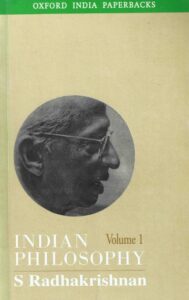Indian Philosophy – Volume 1
By Dr. Sarvepalli Radhakrishnan (1888 - 1975).
738 Pages | First published in 1923, 1999 edition | Oxford India Paperbacks | Softcover | Oxford University Press, New Delhi | ISBN: 0195638190.
Long acknowledged as a classic, this pioneering study of Indian thought charts a fascinating course through an intricate history. From the ṛg-veda to Rāmānujā, Radhakrishnan traces the development of Indian philosophy, while showing its growth as a single tradition of thought through the ages. Individual philosophers and their views are interpreted in the light of this broad argument. Throughout, the author's concern is to show ancient philosophical texts at their best and relate these to contemporary issues of philosophy and religion. The essential elements of individual texts and philosophies are emphasized in order to prevent meaning and significance from being obscured by detail. Parallels between Indian and Western philosophical traditions are also regularly drawn.
From the Introduction (p. 25):
" The founders of philosophy strive for a socio-spiritual reformation of the country. When the Indian civilisation is called a Brāhmanical one, it only means that its main character and dominating motives are shaped by its philosophical thinkers and religious minds, though, these are not all of Brāhmin birth. The idea of Plato, that philosophers must be the rulers and directors of society is practised in India. The ultimate truths are truths of spirit, and in the light of them actual life has to be refined. "
 Bezig met bijwerken...
Bezig met bijwerken...